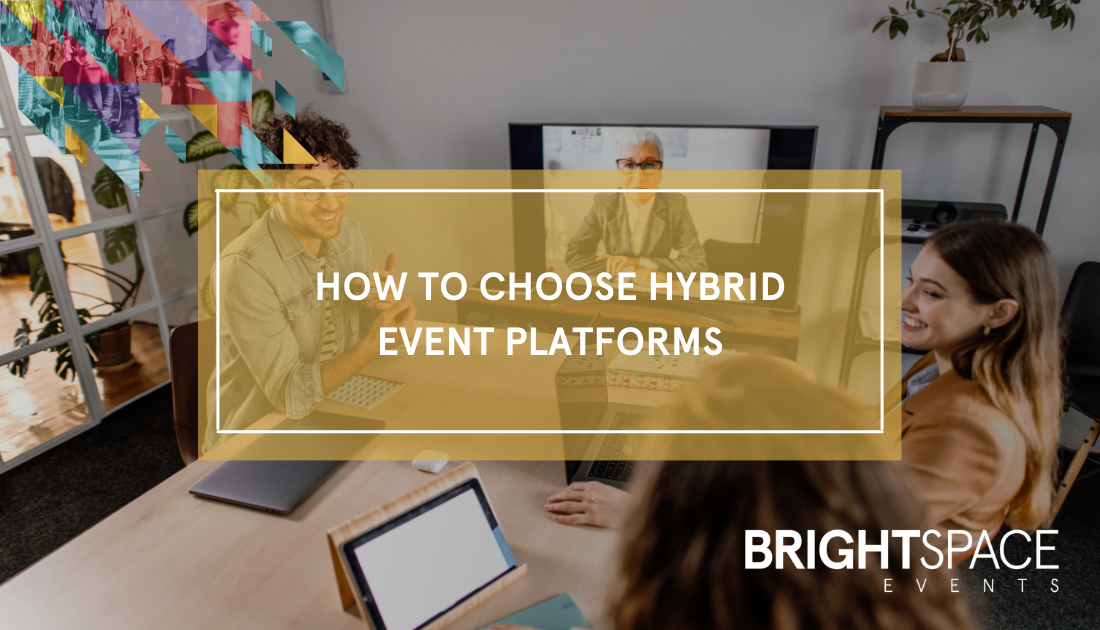Updated March 2024
According to a survey about 73% businesses in the UK have claimed that hybrid events have become an irreplaceable element in their portfolio ever since 2021. There is no doubt that hybrid events are a raging phenomenon in the event management industry in the present times. However, there are some other aspects that need to be considered as well. A Forbes report claims that about 71.1% event organisers find it extremely challenging to connect physical audiences with the virtual ones.
Hence to combat this issue, event organisers unanimously agree that choosing the correct platform to host hybrid events is the most essential part of organising the entire event. A well-suited platform enhances connectivity between virtual and in-person attendees, offering interactive features like live Q&A, polls, and networking opportunities. This fosters a dynamic and inclusive environment, ensuring that participants, regardless of their physical location, can fully participate and benefit from the event.
Considerations while organising a hybrid event
Hybrid events are dynamic and engaging, but the road to success involves careful consideration of various practical aspects. Here’s a breakdown of key factors to keep in mind when organising a hybrid event:
Event Registration and Delegate Management
Differentiating Attendee Types
Ensure your platform allows clear identification of in-person and virtual attendees. Provide tailored customer journeys during registration, allowing customisation for session selection, travel details, ticketing, payments, and appointment setting. Utilise conditional logic for mandatory questions, tailoring the experience based on previous responses.
Delegate Communications
Implement automated communications aligned with attendee types. Schedule emails based on specific actions or inactions, ensuring timely reminders and relevant information. Consider the need for onsite session scanning and badge printing, favouring integrated platforms to avoid data complexities and outdated information.
Event Production
Consider the complexity of hybrid event production. Determine the number of feeds required, assess speaker technology capabilities, and decide on the use of breakout rooms. Plan technical rehearsals, addressing support availability, time zones, and content mix, including live speakers, pre-recorded videos, presentations, and interactive elements.
The Events App
Comprehensive App Features
Evaluate the events app features, emphasising integration with the core platform for seamless updates. Look for real-time engagement tools like moderated Q&A, live polling, and chat for both in-person and remote attendees. Ensure the app supports e-tickets, payments, and confirmations, with additional features such as networking, recording, closed captions, and accessibility options.
In-Person Extras
Consider in-person extras like location information, menus, maps, and hotel details. Provide a web app for onsite attendees, eliminating the need for downloads. Prioritise a help desk for online attendees, potentially with dedicated staff for additional support.
Sponsors and Exhibitors
Virtual Stand Spaces
Address the needs of sponsors and exhibitors, internal and external, requiring virtual stand spaces. Streamline visitor details capture for both in-person and virtual exhibitions, integrating data into a unified database. Plan for follow-up actions, such as scheduling calls or appointments, and sending emails.
Tailoring Tips for the perfect platform for hybrid and virtual events
Define Your Event Needs and Goals
Clearly outline event objectives, audience demographics, and budget constraints. Determine the primary nature of your event – in-person, virtual, or a hybrid blend.
Evaluate Features and Functionality
Look for platforms with interactive live streaming, virtual networking tools, and robust analytics. Ensure the platform supports various devices and operating systems for accessibility.
Assess Technical Requirements and Support
Check technical requirements and evaluate reliability, scalability, and security. Prioritise platforms with responsive customer support to address technical issues promptly.
Prioritise User Experience
Choose a user-friendly platform with an intuitive interface. Conduct demos or trials to assess the overall user experience for both organisers and attendees.
Consider Integration and Flexibility
Select a platform that integrates seamlessly with existing tools and offers customisation and scalability. Review pricing structures, including potential extra fees, to align with budget constraints.
Choose Brightspace events for the ultimate hybrid experience
Transform your gatherings into unforgettable experiences with BrightSpace Hybrid Events. Seamlessly blend in-person and virtual engagement, cutting-edge technology, and unparalleled support, Staffing and Exhibition Stand Design Build. Elevate your event game – contact us at hello@brightspaceevents.co.uk to get started and create moments that resonate!
Frequently Asked Questions (FAQs) for Hybrid Event Platforms
1. How does the platform differentiate between in-person and virtual attendees during the registration process?
Clarify how the hybrid event platform ensures clear identification of attendee types and tailors their registration journey based on session preferences, travel details, and other relevant information.
2. Can the platform handle automated communications to different attendee types, and how are reminders and updates managed?
Explore the platform’s capabilities in automating communications, scheduling reminders, and delivering tailored information to in-person and virtual attendees. Understand the process for managing speaker and attendee communications effectively.
3. What features does the platform offer for event production in a hybrid setting, and how does it support technical rehearsals?
Inquire about the platform’s capabilities in managing multiple feeds, integrating virtual speakers, and facilitating breakout sessions. Understand the flexibility in scheduling technical rehearsals and the level of technical support provided.
4. What comprehensive features does the events app offer, and how does it enhance both in-person and remote attendee experiences?
Delve into the functionalities of the events app, focusing on real-time engagement tools, integration with the core platform, accessibility options, and in-person extras. Ensure a clear understanding of its ability to enhance networking, engagement, and post-event viewing.
5. How does the platform cater to sponsors and exhibitors, particularly those seeking virtual stand spaces?
Explore the platform’s features that support sponsors and exhibitors, both internal and external. Inquire about data capture for in-person and virtual exhibitions, integration into a unified database, and follow-up options such as scheduling calls or sending emails.









